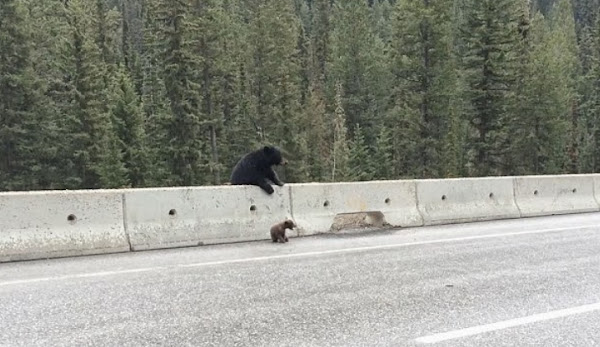This is the amazing moment a bear cub was rescued by its mother after finding itself stranded on the edge of a busy road.
Captured on camera at Kootenay National Park, Canada, the incredible footage shows the tiny cub backing away from the traffic, clearly overwhelmed by its unfamiliar surroundings.
But luckily for the little lost cub, mom wasn't far away and rescues the baby bear by scooping it up in its mouth and hauling it to safety.
The unforgettable moment was filmed by tornado hunter, Ricky Forbes, who was noticed the black bear sitting dangerously close the highway.
Kootenay National Park is a national park of Canada located in southeastern British Columbia. The park consists of 1,406 km2 (543 sq mi) of the Canadian Rockies, including parts of the Kootenay and Park mountain ranges, the Kootenay River and the entirety of the Vermilion River. While the Vermilion River is completely contained within the park, the Kootenay River has its headwaters just outside the park boundary, flowing through the park into the Rocky Mountain Trench and eventually joining the Columbia River. The park ranges in elevation from 918 m (3,012 ft) at the southwestern park entrance to 3,424 m (11,234 ft) at Deltaform Mountain.
Initially called "Kootenay Dominion Park", the park was created in 1920 as part of an agreement between the province of British Columbia and the Canadian federal government to build a highway in exchange for title to a strip of land, approximately 8 km (5.0 mi) on either side of the 94 km route, the Banff–Windermere Highway, to be used solely for park purposes.
While the park is open all year, the major tourist season lasts from June to September. Most campgrounds are open from early May to late September, while limited winter camping is available only at the Dolly Varden campground. A wildlife survey found 242 species of mammals, birds, amphibians and reptiles. The largest species are the ungulates, such as the bighorn sheep, mountain goat, moose, elk, red deer, white-tailed deer, mule deer, though there are also black bears and grizzly bears that live in the park. Coyotes and martens are the only widespread and common carnivores in the park, though bobcats and cougars live in the southern regions. Timber wolves, lynxes, wolverines, minks, fishers, badgers, river otters, skunks and long and short-tailed weasels have also been identified but are not common.
VIDEO
Captured on camera at Kootenay National Park, Canada, the incredible footage shows the tiny cub backing away from the traffic, clearly overwhelmed by its unfamiliar surroundings.
But luckily for the little lost cub, mom wasn't far away and rescues the baby bear by scooping it up in its mouth and hauling it to safety.
The unforgettable moment was filmed by tornado hunter, Ricky Forbes, who was noticed the black bear sitting dangerously close the highway.
Kootenay National Park is a national park of Canada located in southeastern British Columbia. The park consists of 1,406 km2 (543 sq mi) of the Canadian Rockies, including parts of the Kootenay and Park mountain ranges, the Kootenay River and the entirety of the Vermilion River. While the Vermilion River is completely contained within the park, the Kootenay River has its headwaters just outside the park boundary, flowing through the park into the Rocky Mountain Trench and eventually joining the Columbia River. The park ranges in elevation from 918 m (3,012 ft) at the southwestern park entrance to 3,424 m (11,234 ft) at Deltaform Mountain.
Initially called "Kootenay Dominion Park", the park was created in 1920 as part of an agreement between the province of British Columbia and the Canadian federal government to build a highway in exchange for title to a strip of land, approximately 8 km (5.0 mi) on either side of the 94 km route, the Banff–Windermere Highway, to be used solely for park purposes.
While the park is open all year, the major tourist season lasts from June to September. Most campgrounds are open from early May to late September, while limited winter camping is available only at the Dolly Varden campground. A wildlife survey found 242 species of mammals, birds, amphibians and reptiles. The largest species are the ungulates, such as the bighorn sheep, mountain goat, moose, elk, red deer, white-tailed deer, mule deer, though there are also black bears and grizzly bears that live in the park. Coyotes and martens are the only widespread and common carnivores in the park, though bobcats and cougars live in the southern regions. Timber wolves, lynxes, wolverines, minks, fishers, badgers, river otters, skunks and long and short-tailed weasels have also been identified but are not common.
VIDEO





Responses to "Incredible moment black bear saves her tiny cub from oncoming traffic"